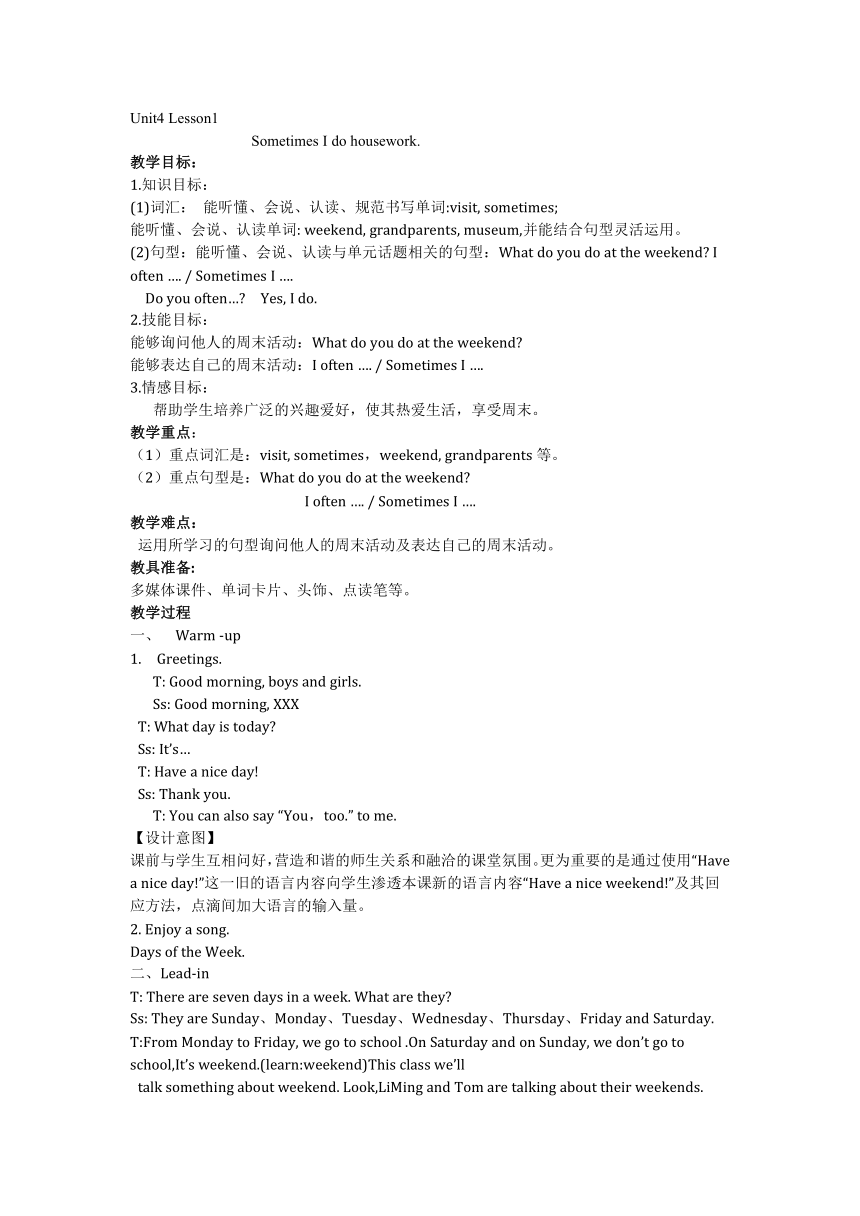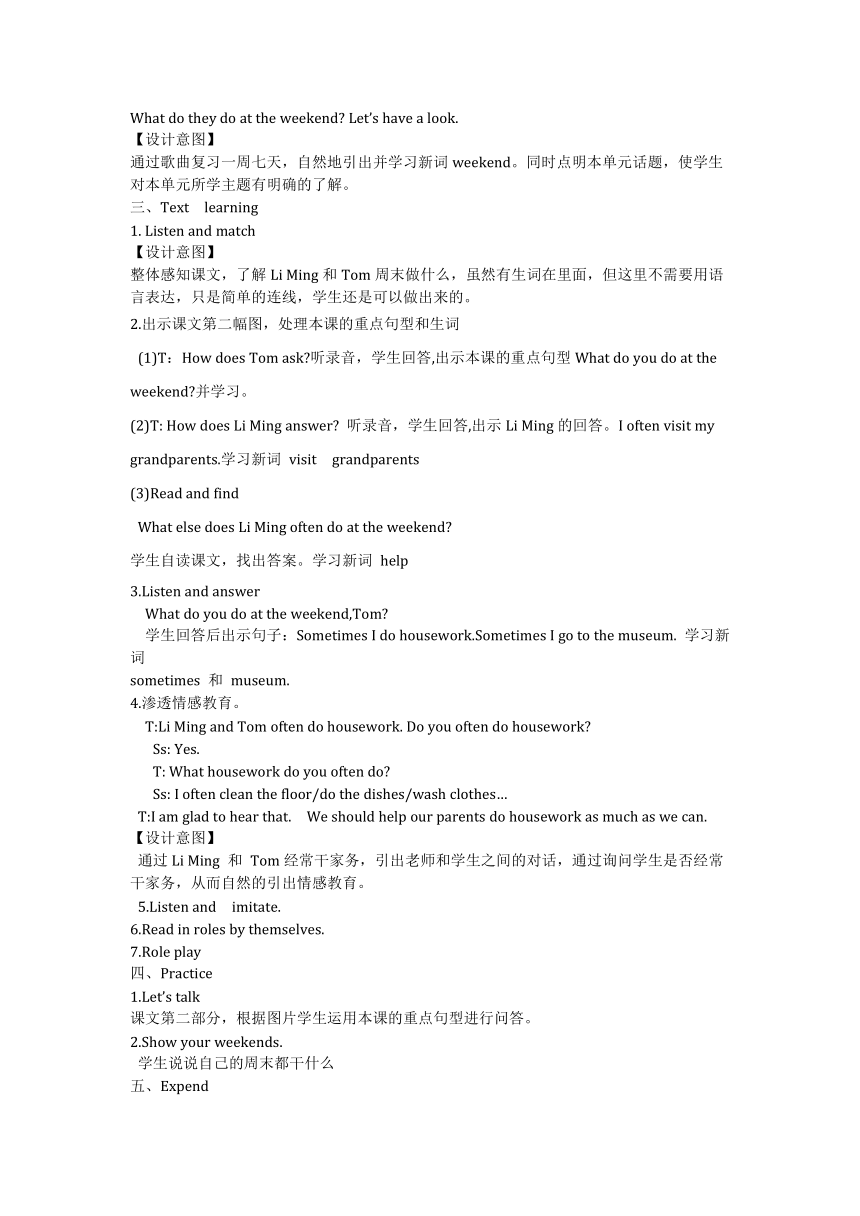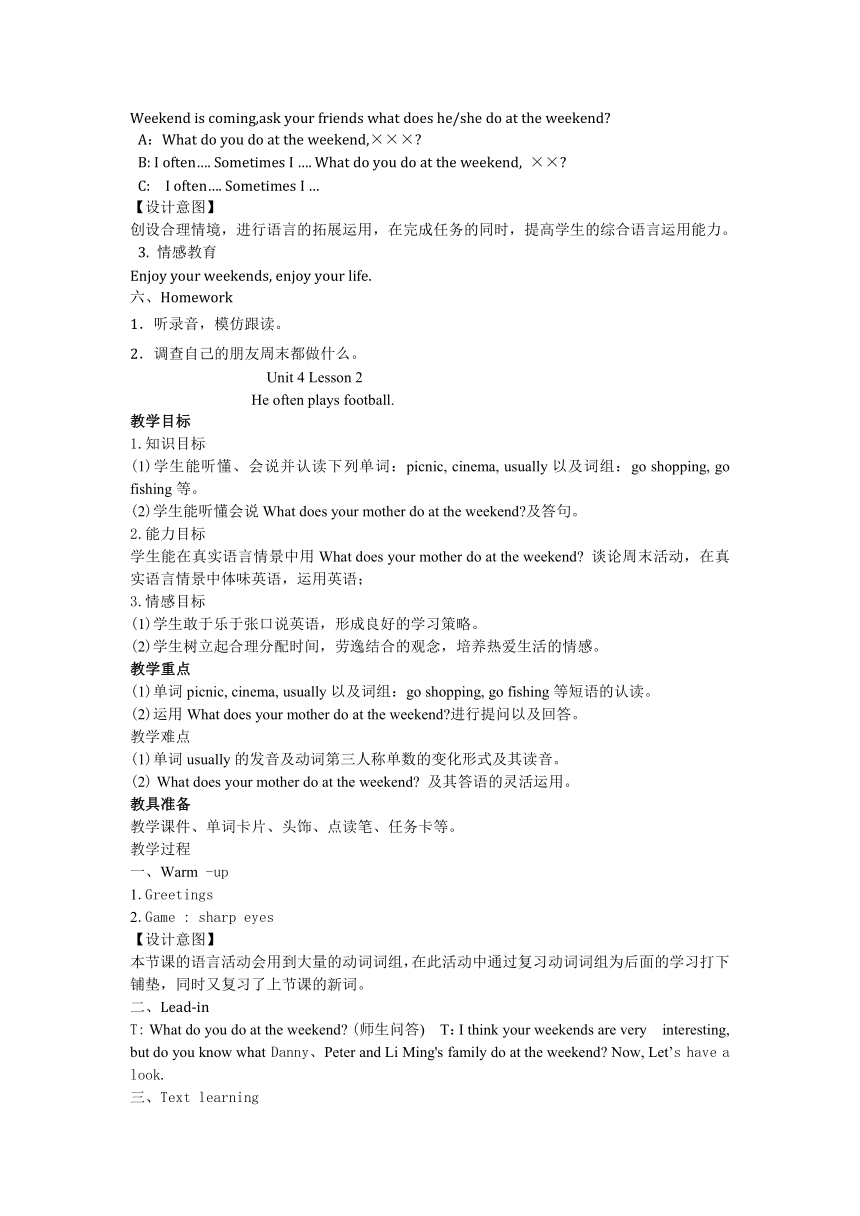Unit 4 Weekend 教案(4个课时)
文档属性
| 名称 | Unit 4 Weekend 教案(4个课时) |  | |
| 格式 | zip | ||
| 文件大小 | 126.2KB | ||
| 资源类型 | 教案 | ||
| 版本资源 | 鲁科版(五四制) | ||
| 科目 | 英语 | ||
| 更新时间 | 2017-03-06 09:57:34 | ||
图片预览



文档简介
Unit4
Lesson1
Sometimes
I
do
housework.
教学目标:
1.知识目标:
(1)词汇:
能听懂、会说、认读、规范书写单词:visit,
sometimes;
能听懂、会说、认读单词:
weekend,
grandparents,
museum,并能结合句型灵活运用。
(2)句型:能听懂、会说、认读与单元话题相关的句型:What
do
you
do
at
the
weekend
I
often
….
/
Sometimes
I
….
Do
you
often…
Yes,
I
do.
2.技能目标:
能够询问他人的周末活动:What
do
you
do
at
the
weekend
能够表达自己的周末活动:I
often
….
/
Sometimes
I
….
3.情感目标:
帮助学生培养广泛的兴趣爱好,使其热爱生活,享受周末。
教学重点:
(1)重点词汇是:visit,
sometimes,weekend,
grandparents等。
(2)重点句型是:What
do
you
do
at
the
weekend
I
often
….
/
Sometimes
I
….
教学难点:
运用所学习的句型询问他人的周末活动及表达自己的周末活动。
教具准备:
多媒体课件、单词卡片、头饰、点读笔等。
教学过程
一、
Warm
-up
1.
Greetings.
T:
Good
morning,
boys
and
girls.
Ss:
Good
morning,
XXX
T:
What
day
is
today
Ss:
It’s…
T:
Have
a
nice
day!
Ss:
Thank
you.
T:
You
can
also
say
“You,too.”
to
me.
【设计意图】
课前与学生互相问好,营造和谐的师生关系和融洽的课堂氛围。更为重要的是通过使用“Have
a
nice
day!”这一旧的语言内容向学生渗透本课新的语言内容“Have
a
nice
weekend!”及其回应方法,点滴间加大语言的输入量。
2.
Enjoy
a
song.
Days
of
the
Week.
二、Lead-in
T:
There
are
seven
days
in
a
week.
What
are
they
Ss:
They
are
Sunday、Monday、Tuesday、Wednesday、Thursday、Friday
and
Saturday.
T:From
Monday
to
Friday,
we
go
to
school
.On
Saturday
and
on
Sunday,
we
don’t
go
to
school,It’s
weekend.(learn:weekend)This
class
we’ll
talk
something
about
weekend.
Look,LiMing
and
Tom
are
talking
about
their
weekends.
What
do
they
do
at
the
weekend
Let’s
have
a
look.
【设计意图】
通过歌曲复习一周七天,自然地引出并学习新词weekend。同时点明本单元话题,使学生对本单元所学主题有明确的了解。
三、Text
learning
1.
Listen
and
match
【设计意图】
整体感知课文,了解Li
Ming和Tom周末做什么,虽然有生词在里面,但这里不需要用语言表达,只是简单的连线,学生还是可以做出来的。
2.出示课文第二幅图,处理本课的重点句型和生词
(1)T:How
does
Tom
ask 听录音,学生回答,出示本课的重点句型What
do
you
do
at
the
weekend 并学习。
(2)T:
How
does
Li
Ming
answer
听录音,学生回答,出示Li
Ming的回答。I
often
visit
my
grandparents.学习新词
visit
grandparents
(3)Read
and
find
What
else
does
Li
Ming
often
do
at
the
weekend
学生自读课文,找出答案。学习新词
help
3.Listen
and
answer
What
do
you
do
at
the
weekend,Tom
学生回答后出示句子:Sometimes
I
do
housework.Sometimes
I
go
to
the
museum.
学习新词
sometimes
和
museum.
4.渗透情感教育。
T:Li
Ming
and
Tom
often
do
housework.
Do
you
often
do
housework
Ss:
Yes.
T:
What
housework
do
you
often
do
Ss:
I
often
clean
the
floor/do
the
dishes/wash
clothes…
T:I
am
glad
to
hear
that.
We
should
help
our
parents
do
housework
as
much
as
we
can.
【设计意图】
通过Li
Ming
和
Tom经常干家务,引出老师和学生之间的对话,通过询问学生是否经常干家务,从而自然的引出情感教育。
5.Listen
and
imitate.
6.Read
in
roles
by
themselves.
7.Role
play
四、Practice
1.Let’s
talk
课文第二部分,根据图片学生运用本课的重点句型进行问答。
2.Show
your
weekends.
学生说说自己的周末都干什么
五、Expend
Weekend
is
coming,ask
your
friends
what
does
he/she
do
at
the
weekend
A:What
do
you
do
at
the
weekend,×××
B:
I
often….
Sometimes
I
….
What
do
you
do
at
the
weekend,
××
C:
I
often….
Sometimes
I
…
【设计意图】
创设合理情境,进行语言的拓展运用,在完成任务的同时,提高学生的综合语言运用能力。
3.
情感教育
Enjoy
your
weekends,
enjoy
your
life.
六、Homework
1.听录音,模仿跟读。
2.调查自己的朋友周末都做什么。
Unit
4
Lesson
2
He
often
plays
football.
教学目标
1.知识目标
(1)学生能听懂、会说并认读下列单词:picnic,
cinema,
usually以及词组:go
shopping,
go
fishing等。
(2)学生能听懂会说What
does
your
mother
do
at
the
weekend 及答句。
2.能力目标
学生能在真实语言情景中用What
does
your
mother
do
at
the
weekend
谈论周末活动,在真实语言情景中体味英语,运用英语;
3.情感目标
(1)学生敢于乐于张口说英语,形成良好的学习策略。
(2)学生树立起合理分配时间,劳逸结合的观念,培养热爱生活的情感。
教学重点
(1)单词picnic,
cinema,
usually以及词组:go
shopping,
go
fishing等短语的认读。
(2)运用What
does
your
mother
do
at
the
weekend 进行提问以及回答。
教学难点
(1)单词usually的发音及动词第三人称单数的变化形式及其读音。
(2)
What
does
your
mother
do
at
the
weekend
及其答语的灵活运用。
教具准备
教学课件、单词卡片、头饰、点读笔、任务卡等。
教学过程
一、Warm
-up
1.Greetings
2.Game
:
sharp
eyes
【设计意图】
本节课的语言活动会用到大量的动词词组,在此活动中通过复习动词词组为后面的学习打下铺垫,同时又复习了上节课的新词。
二、Lead-in
T:
What
do
you
do
at
the
weekend
(师生问答)
T:I
think
your
weekends
are
very
interesting,
but
do
you
know
what
Danny、Peter
and
Li
Ming's
family
do
at
the
weekend
Now,
Let’s
have
a
look.
三、Text
learning
1.
Watch
the
video
and
answer
What
do
Danny
Peter
and
Li
Ming's
family
do
at
the
weekend
【设计意图】
观看视频,初步了解课文大意,让学生带着问题看视频,更具有目的性。
2.看完课文视频后,学生回答问题,学习新词picnic
3.
T:
On
the
way,
they're
talking
about
weekend
life.
What
does
Li
Ming’s
mother
say
4.播放录音,学生回答后,出示并学习本课的重点句型:What
does
your
mother
do
at
the
weekend
5.
T:
How
does
Tom
answer
听录音后,学生回答。出示Tom说的话,学习go
shopping
cinema
6.
教师随
机把Tom的头饰戴在某一个同学的头上,问Tom,
what
does
your
mother
do
at
the
weekend
学生回答She
often
goes
shopping.
Sometimes
she
goes
to
the
cinema
师生问答练习。
【设计意图】
这个对话中所涉及的单词和句型都是本节课的重点和难点,因此在此环节加了一个小操练,这样有利于学生对新学的单词和句型掌握的更好,而且更有效的练习了本节课的难点——第三人称单数。
7.
T:
Now
we
know
Tom's
mother
often
goes
shopping
,
sometimes
she
goes
to
the
cinema.
How
about
Tom's
father
Please
listen
and
answer.
What
does
Tom’s
father
do
at
the
weekend
8.播放录音,学生回答后,学习词组go
fishing
9.教师随
机把Tom的头饰戴在某一个同学的头上,问Tom,
what
does
your
father
do
at
the
weekend
学生回答He
often
goes
fishing.
师生问答练习。
10.T:
OK,
now
we
know
Tom's
father
often
goes
fishing
at
the
weekend.
So
how
about
Danny
What
does
Danny
usually
do
11.
Read
and
find
What
does
Danny
usually
do
at
the
weekend
12.
Listen
and
imitate.
13.
Read
in
roles.
四、Practice
1.
Let’s
guess
课件中展示一些只露出一部分的图片,教师问What
does
he
/she
do
at
the
weekend
让学生猜一猜。可以在图片的一角处适当的加上often
或sometimes,以引导学生说出不同的句型。
2.
Let’s
talk
课文第二部分,根据图片学生运用本课的重点句型进行问答。
五、Expend
1.询问你的同学以及他的父母周末干什么?
2.阅读训练
Lili's
weekend
阅读短文,根据短文完成手里的任务卡。
3.情感渗透
Arrange
your
weekend,
you’ll
have
a
happy
weekend
and
you
can
enjoy
your
weekend!
六、Homework
Listen
and
imitate.
Talk
about
weekend
with
your
friends.
Unit
4
lesson
3
Does
he
often
play
the
violin
教学目标:
1.
能听懂、会说并认读单词violin,
listen,
take及短语play
the
violin,
take
pictures.
2.能听懂、会说并认读句型:Does
he
often
play
the
violin 及其答句:Yes,
he
does.
No,
he
doesn’t.
教学重点
:
能熟练运用句型Does
he
often
…
Do
you
often…来询问他人的周末活动。
教学难点:
能运用句型来询问他人的周末活动以及
does在第三人称单数疑问句中的用法。
教具准备:
多媒体课件
、单词卡片、点读笔、头饰等
教学过程
:
一、
Warm-
up
1.
Greetings
2.Say
and
act
do
homework
play
computer
games
do
housework
play
the
piano
read
books
…
【设计意图】
师生边说边做,能使学生快速进入学习状态,既复习了动词短语,又为本课谈论周末活动做好铺垫。
3.
Free
talk
T:
I
like
reading
boods.
So
I
often
read
books
at
the
weekend.
转问学生What
do
you
do
at
the
weekend
并进一步询问What
does
your
mother
or
father
do
at
the
weekend
【设计意图】
在与学生交流的过程中复习了前两课所学句型,为本课新句型的学习作好准备。
二、
Lead-in
T:We
all
enjoy
our
weekend.
Look,
(出示课件)Jenny
and
Miss
Zhang
are
talking
about
their
weekend.
What
does
Jenny
do
at
the
weekend
Let’s
have
a
look.
三、Text
learning
1.Watch
the
video
and
answer
What
does
Jenny
do
at
the
weekend
学生回答后,出示答案,学习
take
pictures.
2.
出示Tom打电脑的图片,让学生观察图片,老师问What’s
Tom
doing
学生会根据已有知识作答:He’s
playing
computer
games.
教师继而引出本课句型:Does
he
often
play
computer
games
之后让学生们猜一猜,
大部分学生受图片的影响会作出肯定回答。
3.再次播放光盘,这次学生会回答No,
he
doesn’t.
老师问:What
does
he
often
do
on
the
computer
学生回答:
He
often
writes
emails
on
the
computer.
4.情感渗透
Computes
are
very
useful,
but
don't
play
computers
for
a
long
time.
5.出示Peter拉小提琴的图片,让学生观察图片,老师问:What’s
Peter
doing 学生回答,老师接着问:Does
Peter
often
play
the
violin
学习新词violin,播放录音,学生回答问题。
6.老师问:What
does
Guo
Yang
do
at
the
weekend
Please
read
the
picture
4
and
find
the
answer.
让学生读第四幅图并找学生回答问题:He
often
plays
the
piano,
sometimes
he
listens
to
music.
学习新词listen。
【设计意图】
针对课文四幅图分别介绍了四个人物周末活动的特点,根据内容的难易分别通过看一看、猜一猜、听一听、读一读,等几种不同的方法使学生了解他们的周末活动。
7.
Listen
and
imitate
8.
Read
in
roles
四、Practice.
1.Let’s
talk.
T:Peter
often
plays
the
violin
at
the
weekend.
What
else
does
he
often
do 他周末还做些什么呢?let’s
have
a
look.
出示课件,教师先与学生问答Does
he
often
listen
to
music 根据笑脸或哭脸作出回答,示范后同伴俩练习并展示。
2.Guessing
game
课件中展示一些学生喜欢的明星及其周末活动,只露出一部分的图片,让学生用Does
he
/she
watch
TV…at
the
weekend
句型来进行提问,直到猜出正确答案。
【设计意图】
通过猜明星们的周末活动,引发学生们的兴趣,趣味性地巩固了重点句型。
五、Extension
1.Make
a
survey
调查你的朋友周末经常干什么,用笑脸和哭脸表示。
2.
针对调查结果进行报道
【设计意图】
第一项活动是针对本课的重点句型进行的语言训练,第二项活动是在第一项活动的基础上进行的,主要练习了上一课学习过的句型,使的活动比较有层次性,有效的进行了语言综合能力的训练。
六、
Homework.
1.
Let’s
copy
2.
调查家庭成员周末所做的活动。
Lesson
4
Again,
Please!
教学目标:
1.学生能够掌握本单元的单词。
2.能灵活运用本单元句型:What
does/do…do
at
the
weekend
She/He
often
….
来进行交流,以及使用句型Does
he/she… 来进行询问和回答。
教学重点:
能够独立阅读理解文章,并能够组织有效的语言进行回答。
教学难点:
能够针对不同的人称进行询问和回答,在具体的语言环境下,能够熟练运用句型,表达自己的思想,理解双方谈话的内容。
教具准备
多媒体课件、点读笔、任务卡
教学过程:
一、Warm-
up
1.
Greeting
2.
Sharp
eyes
【设计意图】
复习动词词组,特别是本单元的动词词组。
二、Lead-
in
师生自由会话,最后老师询问T:Do
you
often
take
pictures
学生回答后,老师询问:What
about
our
friend
Does
Jenny
often
take
picture
Let’s
have
a
look.
三、Let’s
talk
1.
Watch
and
answer
Does
Jenny
often
take
picture
2.
Read
and
answer
What
does
Mr
Wood
do
at
the
weekend
What
does
Danny
do
at
the
weekend
【设计意图】
自读课文回答问题,主要培养孩子的阅读理解能力,通过自己的阅读来理解文章大意,并能组织语言来进行回答。
3.
Listen
and
imitate
4.Read
in
roles
四、Let’s
read
1.播放录音,学生跟读,感知语音。
2.请学生找出每组中字母组合“bl,
cl,
ai”的发音规律,引导学生发现每组单词的发音规律。
3.然后再次播放录音,学生模仿跟读。并找出与字母组合“bl,
cl,
ai”发音相同的其他学过的单词并朗读。
五、Practice
1.Let’s
do
向同学介绍你和你的家人周末做的事情。
(1)根据事先调查好的家庭成员周末所做的活动,向小组同学进行交流介绍。
S1:My
father
often
does
housework
at
the
weekend.
Sometimes
he
goes
fishing.
My
mother
often
…
(2)小组选派代表,向全班同学进行介绍。
2.
Fun
Time
(1)
Read
the
story
by
themselves
(2)
Read
and
answer
What
does
Duckling
do
at
the
weekend
3.Enjoy
a
video
4.情感渗透
T:
Can
you
play
the
drum
Do
you
like
music 学生回答后,对学生进行情感渗透:Music
can
make
our
life
more
beautiful!
六、Homework
运用本单元所学的语言介绍自己和家人的周末活动,试着用3-5句话把它写下来。
Lesson1
Sometimes
I
do
housework.
教学目标:
1.知识目标:
(1)词汇:
能听懂、会说、认读、规范书写单词:visit,
sometimes;
能听懂、会说、认读单词:
weekend,
grandparents,
museum,并能结合句型灵活运用。
(2)句型:能听懂、会说、认读与单元话题相关的句型:What
do
you
do
at
the
weekend
I
often
….
/
Sometimes
I
….
Do
you
often…
Yes,
I
do.
2.技能目标:
能够询问他人的周末活动:What
do
you
do
at
the
weekend
能够表达自己的周末活动:I
often
….
/
Sometimes
I
….
3.情感目标:
帮助学生培养广泛的兴趣爱好,使其热爱生活,享受周末。
教学重点:
(1)重点词汇是:visit,
sometimes,weekend,
grandparents等。
(2)重点句型是:What
do
you
do
at
the
weekend
I
often
….
/
Sometimes
I
….
教学难点:
运用所学习的句型询问他人的周末活动及表达自己的周末活动。
教具准备:
多媒体课件、单词卡片、头饰、点读笔等。
教学过程
一、
Warm
-up
1.
Greetings.
T:
Good
morning,
boys
and
girls.
Ss:
Good
morning,
XXX
T:
What
day
is
today
Ss:
It’s…
T:
Have
a
nice
day!
Ss:
Thank
you.
T:
You
can
also
say
“You,too.”
to
me.
【设计意图】
课前与学生互相问好,营造和谐的师生关系和融洽的课堂氛围。更为重要的是通过使用“Have
a
nice
day!”这一旧的语言内容向学生渗透本课新的语言内容“Have
a
nice
weekend!”及其回应方法,点滴间加大语言的输入量。
2.
Enjoy
a
song.
Days
of
the
Week.
二、Lead-in
T:
There
are
seven
days
in
a
week.
What
are
they
Ss:
They
are
Sunday、Monday、Tuesday、Wednesday、Thursday、Friday
and
Saturday.
T:From
Monday
to
Friday,
we
go
to
school
.On
Saturday
and
on
Sunday,
we
don’t
go
to
school,It’s
weekend.(learn:weekend)This
class
we’ll
talk
something
about
weekend.
Look,LiMing
and
Tom
are
talking
about
their
weekends.
What
do
they
do
at
the
weekend
Let’s
have
a
look.
【设计意图】
通过歌曲复习一周七天,自然地引出并学习新词weekend。同时点明本单元话题,使学生对本单元所学主题有明确的了解。
三、Text
learning
1.
Listen
and
match
【设计意图】
整体感知课文,了解Li
Ming和Tom周末做什么,虽然有生词在里面,但这里不需要用语言表达,只是简单的连线,学生还是可以做出来的。
2.出示课文第二幅图,处理本课的重点句型和生词
(1)T:How
does
Tom
ask 听录音,学生回答,出示本课的重点句型What
do
you
do
at
the
weekend 并学习。
(2)T:
How
does
Li
Ming
answer
听录音,学生回答,出示Li
Ming的回答。I
often
visit
my
grandparents.学习新词
visit
grandparents
(3)Read
and
find
What
else
does
Li
Ming
often
do
at
the
weekend
学生自读课文,找出答案。学习新词
help
3.Listen
and
answer
What
do
you
do
at
the
weekend,Tom
学生回答后出示句子:Sometimes
I
do
housework.Sometimes
I
go
to
the
museum.
学习新词
sometimes
和
museum.
4.渗透情感教育。
T:Li
Ming
and
Tom
often
do
housework.
Do
you
often
do
housework
Ss:
Yes.
T:
What
housework
do
you
often
do
Ss:
I
often
clean
the
floor/do
the
dishes/wash
clothes…
T:I
am
glad
to
hear
that.
We
should
help
our
parents
do
housework
as
much
as
we
can.
【设计意图】
通过Li
Ming
和
Tom经常干家务,引出老师和学生之间的对话,通过询问学生是否经常干家务,从而自然的引出情感教育。
5.Listen
and
imitate.
6.Read
in
roles
by
themselves.
7.Role
play
四、Practice
1.Let’s
talk
课文第二部分,根据图片学生运用本课的重点句型进行问答。
2.Show
your
weekends.
学生说说自己的周末都干什么
五、Expend
Weekend
is
coming,ask
your
friends
what
does
he/she
do
at
the
weekend
A:What
do
you
do
at
the
weekend,×××
B:
I
often….
Sometimes
I
….
What
do
you
do
at
the
weekend,
××
C:
I
often….
Sometimes
I
…
【设计意图】
创设合理情境,进行语言的拓展运用,在完成任务的同时,提高学生的综合语言运用能力。
3.
情感教育
Enjoy
your
weekends,
enjoy
your
life.
六、Homework
1.听录音,模仿跟读。
2.调查自己的朋友周末都做什么。
Unit
4
Lesson
2
He
often
plays
football.
教学目标
1.知识目标
(1)学生能听懂、会说并认读下列单词:picnic,
cinema,
usually以及词组:go
shopping,
go
fishing等。
(2)学生能听懂会说What
does
your
mother
do
at
the
weekend 及答句。
2.能力目标
学生能在真实语言情景中用What
does
your
mother
do
at
the
weekend
谈论周末活动,在真实语言情景中体味英语,运用英语;
3.情感目标
(1)学生敢于乐于张口说英语,形成良好的学习策略。
(2)学生树立起合理分配时间,劳逸结合的观念,培养热爱生活的情感。
教学重点
(1)单词picnic,
cinema,
usually以及词组:go
shopping,
go
fishing等短语的认读。
(2)运用What
does
your
mother
do
at
the
weekend 进行提问以及回答。
教学难点
(1)单词usually的发音及动词第三人称单数的变化形式及其读音。
(2)
What
does
your
mother
do
at
the
weekend
及其答语的灵活运用。
教具准备
教学课件、单词卡片、头饰、点读笔、任务卡等。
教学过程
一、Warm
-up
1.Greetings
2.Game
:
sharp
eyes
【设计意图】
本节课的语言活动会用到大量的动词词组,在此活动中通过复习动词词组为后面的学习打下铺垫,同时又复习了上节课的新词。
二、Lead-in
T:
What
do
you
do
at
the
weekend
(师生问答)
T:I
think
your
weekends
are
very
interesting,
but
do
you
know
what
Danny、Peter
and
Li
Ming's
family
do
at
the
weekend
Now,
Let’s
have
a
look.
三、Text
learning
1.
Watch
the
video
and
answer
What
do
Danny
Peter
and
Li
Ming's
family
do
at
the
weekend
【设计意图】
观看视频,初步了解课文大意,让学生带着问题看视频,更具有目的性。
2.看完课文视频后,学生回答问题,学习新词picnic
3.
T:
On
the
way,
they're
talking
about
weekend
life.
What
does
Li
Ming’s
mother
say
4.播放录音,学生回答后,出示并学习本课的重点句型:What
does
your
mother
do
at
the
weekend
5.
T:
How
does
Tom
answer
听录音后,学生回答。出示Tom说的话,学习go
shopping
cinema
6.
教师随
机把Tom的头饰戴在某一个同学的头上,问Tom,
what
does
your
mother
do
at
the
weekend
学生回答She
often
goes
shopping.
Sometimes
she
goes
to
the
cinema
师生问答练习。
【设计意图】
这个对话中所涉及的单词和句型都是本节课的重点和难点,因此在此环节加了一个小操练,这样有利于学生对新学的单词和句型掌握的更好,而且更有效的练习了本节课的难点——第三人称单数。
7.
T:
Now
we
know
Tom's
mother
often
goes
shopping
,
sometimes
she
goes
to
the
cinema.
How
about
Tom's
father
Please
listen
and
answer.
What
does
Tom’s
father
do
at
the
weekend
8.播放录音,学生回答后,学习词组go
fishing
9.教师随
机把Tom的头饰戴在某一个同学的头上,问Tom,
what
does
your
father
do
at
the
weekend
学生回答He
often
goes
fishing.
师生问答练习。
10.T:
OK,
now
we
know
Tom's
father
often
goes
fishing
at
the
weekend.
So
how
about
Danny
What
does
Danny
usually
do
11.
Read
and
find
What
does
Danny
usually
do
at
the
weekend
12.
Listen
and
imitate.
13.
Read
in
roles.
四、Practice
1.
Let’s
guess
课件中展示一些只露出一部分的图片,教师问What
does
he
/she
do
at
the
weekend
让学生猜一猜。可以在图片的一角处适当的加上often
或sometimes,以引导学生说出不同的句型。
2.
Let’s
talk
课文第二部分,根据图片学生运用本课的重点句型进行问答。
五、Expend
1.询问你的同学以及他的父母周末干什么?
2.阅读训练
Lili's
weekend
阅读短文,根据短文完成手里的任务卡。
3.情感渗透
Arrange
your
weekend,
you’ll
have
a
happy
weekend
and
you
can
enjoy
your
weekend!
六、Homework
Listen
and
imitate.
Talk
about
weekend
with
your
friends.
Unit
4
lesson
3
Does
he
often
play
the
violin
教学目标:
1.
能听懂、会说并认读单词violin,
listen,
take及短语play
the
violin,
take
pictures.
2.能听懂、会说并认读句型:Does
he
often
play
the
violin 及其答句:Yes,
he
does.
No,
he
doesn’t.
教学重点
:
能熟练运用句型Does
he
often
…
Do
you
often…来询问他人的周末活动。
教学难点:
能运用句型来询问他人的周末活动以及
does在第三人称单数疑问句中的用法。
教具准备:
多媒体课件
、单词卡片、点读笔、头饰等
教学过程
:
一、
Warm-
up
1.
Greetings
2.Say
and
act
do
homework
play
computer
games
do
housework
play
the
piano
read
books
…
【设计意图】
师生边说边做,能使学生快速进入学习状态,既复习了动词短语,又为本课谈论周末活动做好铺垫。
3.
Free
talk
T:
I
like
reading
boods.
So
I
often
read
books
at
the
weekend.
转问学生What
do
you
do
at
the
weekend
并进一步询问What
does
your
mother
or
father
do
at
the
weekend
【设计意图】
在与学生交流的过程中复习了前两课所学句型,为本课新句型的学习作好准备。
二、
Lead-in
T:We
all
enjoy
our
weekend.
Look,
(出示课件)Jenny
and
Miss
Zhang
are
talking
about
their
weekend.
What
does
Jenny
do
at
the
weekend
Let’s
have
a
look.
三、Text
learning
1.Watch
the
video
and
answer
What
does
Jenny
do
at
the
weekend
学生回答后,出示答案,学习
take
pictures.
2.
出示Tom打电脑的图片,让学生观察图片,老师问What’s
Tom
doing
学生会根据已有知识作答:He’s
playing
computer
games.
教师继而引出本课句型:Does
he
often
play
computer
games
之后让学生们猜一猜,
大部分学生受图片的影响会作出肯定回答。
3.再次播放光盘,这次学生会回答No,
he
doesn’t.
老师问:What
does
he
often
do
on
the
computer
学生回答:
He
often
writes
emails
on
the
computer.
4.情感渗透
Computes
are
very
useful,
but
don't
play
computers
for
a
long
time.
5.出示Peter拉小提琴的图片,让学生观察图片,老师问:What’s
Peter
doing 学生回答,老师接着问:Does
Peter
often
play
the
violin
学习新词violin,播放录音,学生回答问题。
6.老师问:What
does
Guo
Yang
do
at
the
weekend
Please
read
the
picture
4
and
find
the
answer.
让学生读第四幅图并找学生回答问题:He
often
plays
the
piano,
sometimes
he
listens
to
music.
学习新词listen。
【设计意图】
针对课文四幅图分别介绍了四个人物周末活动的特点,根据内容的难易分别通过看一看、猜一猜、听一听、读一读,等几种不同的方法使学生了解他们的周末活动。
7.
Listen
and
imitate
8.
Read
in
roles
四、Practice.
1.Let’s
talk.
T:Peter
often
plays
the
violin
at
the
weekend.
What
else
does
he
often
do 他周末还做些什么呢?let’s
have
a
look.
出示课件,教师先与学生问答Does
he
often
listen
to
music 根据笑脸或哭脸作出回答,示范后同伴俩练习并展示。
2.Guessing
game
课件中展示一些学生喜欢的明星及其周末活动,只露出一部分的图片,让学生用Does
he
/she
watch
TV…at
the
weekend
句型来进行提问,直到猜出正确答案。
【设计意图】
通过猜明星们的周末活动,引发学生们的兴趣,趣味性地巩固了重点句型。
五、Extension
1.Make
a
survey
调查你的朋友周末经常干什么,用笑脸和哭脸表示。
2.
针对调查结果进行报道
【设计意图】
第一项活动是针对本课的重点句型进行的语言训练,第二项活动是在第一项活动的基础上进行的,主要练习了上一课学习过的句型,使的活动比较有层次性,有效的进行了语言综合能力的训练。
六、
Homework.
1.
Let’s
copy
2.
调查家庭成员周末所做的活动。
Lesson
4
Again,
Please!
教学目标:
1.学生能够掌握本单元的单词。
2.能灵活运用本单元句型:What
does/do…do
at
the
weekend
She/He
often
….
来进行交流,以及使用句型Does
he/she… 来进行询问和回答。
教学重点:
能够独立阅读理解文章,并能够组织有效的语言进行回答。
教学难点:
能够针对不同的人称进行询问和回答,在具体的语言环境下,能够熟练运用句型,表达自己的思想,理解双方谈话的内容。
教具准备
多媒体课件、点读笔、任务卡
教学过程:
一、Warm-
up
1.
Greeting
2.
Sharp
eyes
【设计意图】
复习动词词组,特别是本单元的动词词组。
二、Lead-
in
师生自由会话,最后老师询问T:Do
you
often
take
pictures
学生回答后,老师询问:What
about
our
friend
Does
Jenny
often
take
picture
Let’s
have
a
look.
三、Let’s
talk
1.
Watch
and
answer
Does
Jenny
often
take
picture
2.
Read
and
answer
What
does
Mr
Wood
do
at
the
weekend
What
does
Danny
do
at
the
weekend
【设计意图】
自读课文回答问题,主要培养孩子的阅读理解能力,通过自己的阅读来理解文章大意,并能组织语言来进行回答。
3.
Listen
and
imitate
4.Read
in
roles
四、Let’s
read
1.播放录音,学生跟读,感知语音。
2.请学生找出每组中字母组合“bl,
cl,
ai”的发音规律,引导学生发现每组单词的发音规律。
3.然后再次播放录音,学生模仿跟读。并找出与字母组合“bl,
cl,
ai”发音相同的其他学过的单词并朗读。
五、Practice
1.Let’s
do
向同学介绍你和你的家人周末做的事情。
(1)根据事先调查好的家庭成员周末所做的活动,向小组同学进行交流介绍。
S1:My
father
often
does
housework
at
the
weekend.
Sometimes
he
goes
fishing.
My
mother
often
…
(2)小组选派代表,向全班同学进行介绍。
2.
Fun
Time
(1)
Read
the
story
by
themselves
(2)
Read
and
answer
What
does
Duckling
do
at
the
weekend
3.Enjoy
a
video
4.情感渗透
T:
Can
you
play
the
drum
Do
you
like
music 学生回答后,对学生进行情感渗透:Music
can
make
our
life
more
beautiful!
六、Homework
运用本单元所学的语言介绍自己和家人的周末活动,试着用3-5句话把它写下来。
同课章节目录
- Unit 1 Countries
- Lesson 1 I'm from Britain.
- Lesson 2 Where's she from?
- Lesson 3 I live in Beijing.
- Lesson 4 Again, please!
- Unit 2 Housework
- Lesson 1 Can you clean the windows?
- Lesson 2 What are you doing?
- Lesson 3 What's mum doing?
- Lesson 4 Again, please!
- Unit 3 Restaurant
- Lesson 1 I want to eat noodles.
- Lesson 2 What would you like?
- Lesson 3 Would you like something to drink?
- Lesson 4 Again, please!
- Unit 4 Weekend
- Lesson 1 Sometimes I do housework.
- Lesson 2 He often plays football.
- Lesson 3 Does he often play the violin?
- Lesson 4 Again, please!
- Unit 5 Shopping
- Lesson 1 Can I help you?
- Lesson 2 Do you have schoolbags?
- Lesson 3 How much is this shirt?
- Lesson 4 Again, please!
- Unit 6 Travel
- Lesson 1 I'm going to Mount Taishan.
- Lesson 2 How are you going there?
- Lesson 3 What are you going to do there?
- Lesson 4 Again, please!
